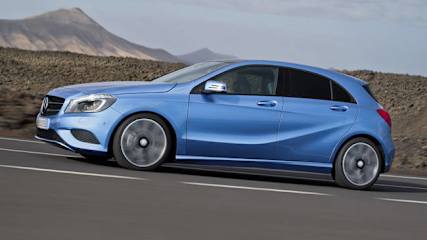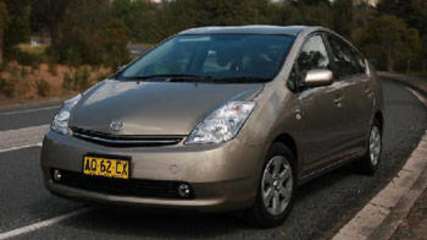Mercedes-Benz A200 2008 News

New Mercedes-Benz A-Class details
Read the article
By Craig Duff · 22 May 2012
The A250's 155kW/350Nm petrol engine will headline the Mercedes-Benz A-Class range when it goes in sale in Australia in the first quarter of next year.
Engine details have been released for the range and show the A250 Sport to be the luxury carmaker's take on hot hatches and with a 0-100km/h time of just 6.6 seconds, is a seriously quick car.But there's more on the way.
Pressed about a rumoured all-wheel-drive AMG performance model, Stamoulis confirms "we should see another variant later in the life of the A-Class and it will be more powerful than an A250 Sport". Stamoulis says powertrains are still being assessed for Australia but adds improvements to efficiency and power with the petrol engines means the model range is likely to skew in that direction.
"The diesel engines are a showcase of our technology and already meet Euro 6 emission levels," he says. "Just what engines and transmissions we take is still being decided." All engines use direct injection and turbocharging and the idle stop/start engine shut-off.
Mercedes-Benz Australia is expected to put its hand up for all three petrol engines, starting with the 1.6-litre turbo mills powering the 90kW/200Nm A180 and the 100kW/250Nm A200. Both will be sold in Europe with six-speed manual and seven-speed dual-clutch manual automated transmissions, while the A250 will be an auto-only offering.
There are four diesel engines though Mercedes-Benz Australia is only thought to be looking at the 100kW/300Nm A200 CDI and the top-spec A220 with 125kW/350Nm. The standard features run from a radar-based crash-avoidance system that should prevent nose-to-tail shunts at up to 30km/h to direct integration with Apple's Siri voice-control system to let drivers navigate the web or their iPhone while on the move.
Its safety credentials are all but guaranteed — the B-Class is built on the same platform and has just been rated the safest car ANCAP has yet tested. Mercedes has yet to announce pricing for the A-Class but Carsguide expects it to start in the mid $30,000s and climb to around $50,000 for the A250. The A-Class is one of the models Mercedes sees taking it back to the top of the global prestige car heap and the five-door hatch will be priced and equipped to compete with the likes of BMW's 1 Series and the Audi A3.

Mtech a fuel revolution
Read the article
By Kevin Hepworth · 14 Apr 2008
The chance to save $450 a year on fuel bills and help save the planet could be enough to lure Sydney drivers to test a new fuel-saving system.Technology company Mtech Australia is looking for owners of a wide range of cars to take part in a three-month test of the company's ceramic fuel-saving technology.Using nano-technology, Mtech claims to be able to reduce fuel consumption by as much as 15 per cent and greenhouse-gas emission by as much as 23 per cent — as well as boosting power.“We already have qualified independent test results proving Mtech Fuel Saver's credentials, and today we want Australians to step up to the plate and commit to reducing their carbon emissions and fuel consumption in their vehicles,” Mtech chief executive David Bignold says.According to Mtech literature, the system works by encouraging the fuel molecules to break down from clusters to single molecules.The result is a change in the properties of the fuel, allowing better atomisation of the fuel before delivery to the combustion chamber.This, in turn, improves volumetric efficiency and improves fuel efficiency.Mtech claims the system will work on petrol, diesel and LPG-fuelled vehicles, with a range of results depending on the age of the car and the condition of the car's engine.“We know that different vehicles and models have varying results in carbon emissions and fuel consumption, and now we want to prove that Mtech Fuel Saver gets results regardless of the vehicle type,” Bignold says.For the public test, the company is seeking models as diverse as the Toyota Prius, Mercedes-Benz A200, Ford Territory, Holden Commodore, Ford Falcon and many others.“With the average family sedan consuming more than 1400 litres of fuel each year and emitting four tonnes of carbon, participants can save up to $450 per year,” Bignold says.The greater the fuel usage, the greater the saving, Bignold says.He claims a family spending $130 a week on fuel could cut their annual bill by around $1000, while a company with a $3000-a-week fuel bill would be in line for savings of more than $23,000.Ten years of study on the system has been ratified by Associate Professor Dr Peter Dingle, from Murdoch University, in a paper published last November.“The statistics and research are compelling,” Professor Dingle says.“There are more than 14 million registered vehicles travelling over two billion kilometres a year in Australia.“This rate is growing and, as it does, so do the pollutants that result.“This (the claimed 23 per cent emission reduction) could equate to a possible saving of around 25 million tonnes of CO2 a year if applied to the Australian fleet.”Anyone interested in registering for the public test can click here for details. Applications close on April 25.Carsguide would like to know what you think about Mtech's latest nano-technology? is 23 percent enough to help you pay your bills?

Merc's new eco-friendly range
Read the article
By Kevin Hepworth · 15 Sep 2007
Mercedes-Benz swamped the Frankfurt Motor Show with a range of eco-friendly cars, including seven hybrid cars, eight ultra-clean diesel Bluetec models and several new engines that meet Euro 5 emissions targets due in 2009.However, show goers were stunned by the striking F700 concept sedan, which uses an innovative DiesOtto and hybrid drive system that uses just 5.3 litres per 100km and delivers 127g/km CO2 emissions.The DiesOtto engine, housed in a sleek luxury body called the F700 research vehicle, is claimed to provide the best elements of both diesel and petrol engines. The engine is mated to a new hybrid starter/generator and seven-speed automatic transmission. It is a four-cylinder, 1.8-litre two-stage charging petrol engine that Mercedes says combines the frugal virtues of a diesel with the low emissions of a petrol engine.It can deliver 175kW with the electric motor producing an extra 15kW while torque is 400Nm.Mercedes executives say the car will accelerate to 100km/h in 7.5 seconds and has a top speed of 200km/h. Apart from the engine and powertrain, the F700 has a sophisticated suspension that uses two laser scanners to view the road ahead and adjust the suspension.The luxury Mercedes also uses a new “human machine interface” with a virtual operating assistant called the avatar which can assist the driver with specific functions, such as adjusting the airconditioning or dialling a phone number.Visually, the F700 is based on the S-Class sedan but has an extra 285mm built into the wheelbase. The rear doors are rear hinged to allow for easy access to the roomy cabin.The big Merc is one of the varied ways carmakers at the show are attempting to create greener machines. Car industry green expert Ted Grozier says the show illustrates how the industry is faring in its efforts to reduce its reliance on gas-guzzling larger vehicles.“The conventional wisdom is that the US will go hybrid and in Europe the diesel is being challenged,” says Grozier, of Green Order, a New York-based advisory group that counts General Motors, among others, as clients for its advice on how to make cars cleaner. “This may be a pivotal year for the industry in the battle for greener cars and the gloves have come off.”Indeed, BMW, Porsche, Volkswagen and DaimlerChrysler are among those showing cars with low-emission diesel engines and hybrids, featuring electricity to augment traditional fuel motors, as well as hydrogen fuel cell concepts that BMW is researching. It is all part of the effort to make high-mileage, cleaner cars that also meet drivers' expectations for performance.Nissan showed its Mixim concept car, an electric car powered by lithium ion batteries, with the driver's seat in the middle and steering controls inspired by video-game controllers.Unsurprisingly, it is geared toward younger drivers who spend a lot of time behind a computer keyboard. Ford showed off the current models under its ECOnetic label that produces a lower level of emissions.France's PSA Peugeot-Citroen has its 308 BioFlex compact at the show. The car uses biofuels, or fuel obtained from crops. GM goes a step further with a car powered by a hydrogen fuel cell. The show is also a chance for carmakers to explore new concepts and designs that may or may not take shape on the assembly line. Ford is eager to pique consumer interest in its new subcompact concept car, the Verve.If successful, it could be the basis of a new small car for global sales. It would come to Australia as the next generation Fiesta.Designed in Europe, the Verve concept has a rounded design and is demonstrably smaller than most cars on US roads.The president of the German Association of the Automotive Industry Matthias Wissmann says 1081 companies are at the Frankfurt Motor Show.In total, 88 new models are debuting at the biennial event which runs until September 23.




